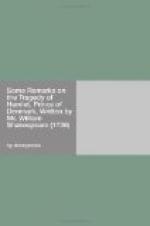This position opens the way for further advances. Thus, beginning with the assumption that the mind of the spectator or the reader is the chief arbiter in such matters, Anonymous gives us what is perhaps the most enlightened comment on probability and illusion to be found in the period between Dryden and Coleridge. His test for probability is what the imagination will readily accept; and the imagination, he says, will bear a “strong Imposition.” Reason, to be sure, demands that actions and speeches shall be “natural”—but natural within the framework of the situation and character as established by the dramatist on the imaginative level. The author’s words on illusion recall the passage in Dryden about reason’s suffering itself to be “hoodwinked” by imaginative presentation, foreshadow Coleridge’s “willing suspension of disbelief,” and directly suggest Johnson’s passages on the subject. Experience will show, he says, “that no Dramatick Piece can affect us but by the Delusion of our Imagination; which, to taste true and real Pleasures at such Representations, must undergo a very great Imposition.” For example, on our stage all nations speak English, and shock no one; also the actors are recognized as actors and not as the persons represented, and the stage as a stage and not Rome, or Denmark. Without such imposition “farewell all Dramatick Performances.”
And then, in continuation of this pre-Johnsonian (and pre-Coleridgean) argument he goes on to say that delusion must be accepted, never, however, in defiance of our reason but with the approval of our reason. That Shakespeare’s plays create delusion with the assistance of reason is proved by the success they have so long enjoyed. Sublimity of sentiments, exalted diction, and “in short all the Charms of his Poetry, far outweigh any little absurdities in his Plots.” He knew how to work up “great and moving Circumstances in such a Way as to affect our Passions strongly.” The word used here throughout is delusion, but the sense, just as is largely the case with Johnson, is illusion—not a demand for such a verisimilitude as will deceive, but for such representation as will lead the imagination to voluntary, pleasurable acceptance.




